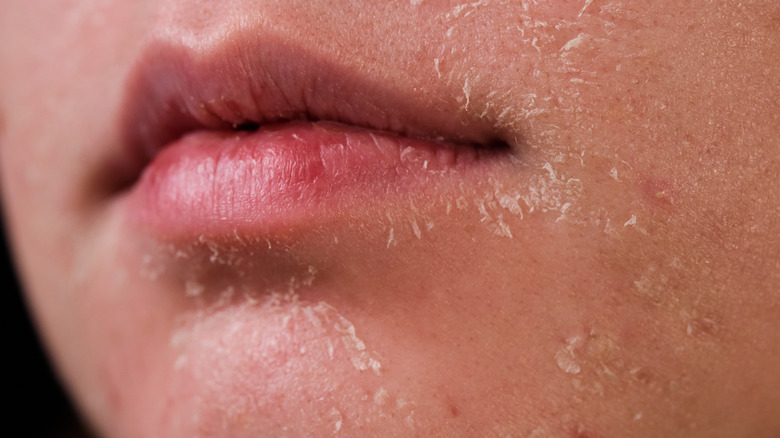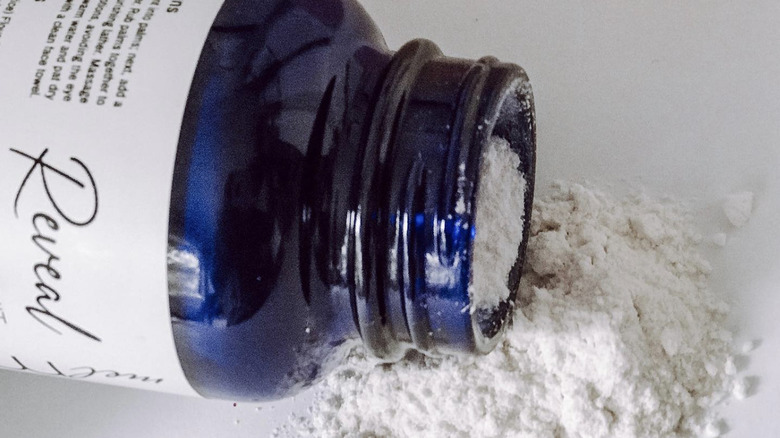If Your Skin Is Too Sensitive For Chemical Peels, Try These Instead
It's no secret that chemical peels have become one of the most popular skin treatment options available today. Dermatologists and patients have praised this treatment as a viable option for deeply troubled skin. However, it is not for the weak, as this treatment can be very harsh depending on the strength of the peel. Typically, a solution made of glycolic acid will be applied to the skin. After allowing it to sit for a while, it is taken off using another agent before hydrating serums are applied to the skin. In the days following, the outer layer of skin will peel off, revealing the more youthful layer beneath. This process is typically completed within a week's time.
If this method sounds a bit extreme, that's because it is, and in some cases, it is too much for sensitive skin to bear. Thankfully, there are alternatives designed specifically for those who cannot undergo chemical peels, including enzymes and exfoliant powders. Both have been proven highly effective for clearing up the face in place of actually peeling off the top layer of skin, and even better, these options are much milder and can be performed at home. So how do you know which is best for you? Well, there are a few factors to consider.
Enzymes are derived from plants
Enzymes are such a great choice for sensitive skin because they are proteins pulled from plants. Bromelain found in pineapple or actinidin in bananas are all proteins used to help with skin concerns. They work by breaking down the keratin protein found on the surface. After this happens, dead skin cells begin to disintegrate, revealing fresher, brighter skin. Enzymes are a great choice for people who have dry skin in addition to sensitivity. One great product on the market is the Dr. Barbara Sturm Enzyme Cleanser. It comes in a powder form and is activated by water, which turns it into a gentle foam that removes dead skin, leaving an instantly smooth appearance.
In addition to altering your routine with face products, experts also recommend trying digestive enzymes. These break down food in the body, aiding in digestion. However, they can also help remedy sensitive skin.
Dr. Woodson Merrell, author of The Detox Prescription, explained the importance of these supplements. "Using digestive enzymes and probiotics to help with the proper absorption and breakdown of foods can be really helpful for fighting acne. Skin conditions such as eczema, psoriasis, or acne are mostly an internal problem coming out. Putting topical ointments on your skin can be helpful, but the most important component of your skin health is what happens to it from the inside," Dr. Merrell told Well + Good. Additionally, digestive enzymes can also reduce inflammation, another huge factor of problematic skin.
Exfoliant powders enhances the skin
Like enzyme products, this fine powder uses liquid to make a paste or lather that gets rid of dead skin cells and other impurities. As a result, this leaves a radiating complexion and extremely smooth skin without the harshness of some exfoliants, since these exfoliant powders are also naturally based, using grains such as oats, bamboo, and rice. This powder dissolves dead skin cells instead of stripping away the top layer of skin, creating a smooth finish. Another bonus is that this powder can serve different purposes depending on how much water you use. If you are looking for a cleanser, you'll add more water. However, if you want to feel the texture for a gentle scrub, less water is best. Junoco Clarifying Cleansing Powder is a great option because it is an enzyme exfoliant. With ingredients such as papain (a papaya enzyme), hyaluronic acid, and rice powder, this powder cleans the skin, strips it of impurities, and pumps it with hydration. But be mindful, as exfoliating every day may dry out your skin.
As we all know by now, treating blemishes on sensitive skin is not the easiest task. Though chemical peels have emerged as a go-to treatment for hyperpigmentation, it does come with its own set of risks. Fungal infections, scarring, or permanent changes in skin color are all possible side effects of chemical peels. If your skin typically doesn't respond well to chemicals, try either of these alternatives to achieve a flawless face.

